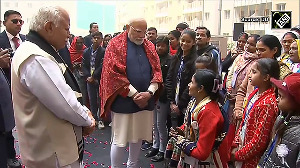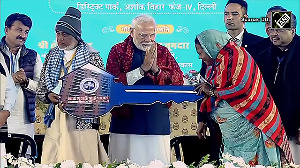Cong leaders speak in two voices but final stand may be decided at a meeting headed by Rahul Gandhi next week

The government is open to the idea of “ring-fencing” the goods and services tax rate as proposed by Congress leader Anand Sharma.
A senior minister on Saturday welcomed Sharma’s suggestion. “It’s a sensible suggestion. We will keep talking to them,” he said.
Sharma, Congress’ deputy leader in Rajya Sabha where the Constitution Amendment Bill on GST is stuck, is reported to have said that his party was open to discussing its demand of including the tax rate in the Bill if the government were to come out with a suggestion to “ring-fence” the tax rate.
Now that Congress vice-president Rahul Gandhi is back from Europe, the party is likely to meet next week to decide on its position on GST ahead of the Monsoon Session of Parliament.
However, confusion still persists as many other Congress leaders, including former finance minister P Chidambaram, have said that the government had not approached them and the party would continue to stick to its earlier demand of a cap on the GST rate.
The constitution amendment Bill cleared by the Lok Sabha doesn’t mention any cap on the GST rate. Congress leaders said successive governments should not be allowed to change the GST rate and the cap, which should be around 18 per cent, must be a part of the constitution amendment Bill.
A panel of the empowered group of state finance ministers had earlier proposed a revenue-neutral GST rate of around 27 per cent. Since then, speculations have been rife that the GST rate could be significantly higher than what Congress has been asking for.
However, the finance ministry-appointed committee, headed by Chief Economic Adviser Arvind Subramanian, recommended a standard rate of 17-18 per cent.
Congress leader Jairam Ramesh said the government was yet to approach the party.
“Has the government given us one piece of paper saying: if not this, then this? Why can’t Narendra Modi say he wants a Good and Simple Tax,” quipped the Rajya Sabha MP.
“We want a GST that is industry-friendly, trader-friendly, but also consumer friendly. A tax of 26 per cent or above is not the way forward,” Jairam Ramesh added.
Meanwhile, at an event in New Delhi on Saturday, Finance Minister Arun Jaitley posed a question if it was desirable to continue having high interest rates on savings which translates into higher cost of lending and sluggishness in the economy.
India, he said, has a “peculiar” characteristic of having “quite high” percentage of domestic savings. “Now, whether domestic savings are only to be used by such instruments which give you a higher return and create an interest regime which is extremely costly and makes the economy sluggish, or higher returns are to be got from such instruments as funds, bonds, shares (that finance projects and economic activity),” he asked.
Speaking at a function to unveil commemorative postage stamp to mark 140 years of the BSE, he said the essence of all economic activity was investment and investment was going to come from where resources are available.
“A lot of them have also an element of secured investment in them which can give people a very respectable return itself. That's the basis on which pension funds the world over have been functioning and I think these are areas of advances as we grow over the next several years and decades. More and more opportunities are going to come to us,” he said.
Jaitley said Indian economy would need a lot of investment for a reasonably long period to bridge the infrastructure and industrialisation deficit that has existed for decades.
“And the starting point of all activity has to be investment, it has to be resource-raising, it has to be important companies in the private sector and sometimes PPP, which will ensure this deficit is met,” he said.
In this context, BSE, as an instrument for raising funds, is an important institution, he said. “Last few years have seen India grow well, essentially grow well on the strength of enhanced public investment (and) FDI. The best of private sector in that development process is yet to be seen,” he said.







 © 2025 Rediff.com -
© 2025 Rediff.com -